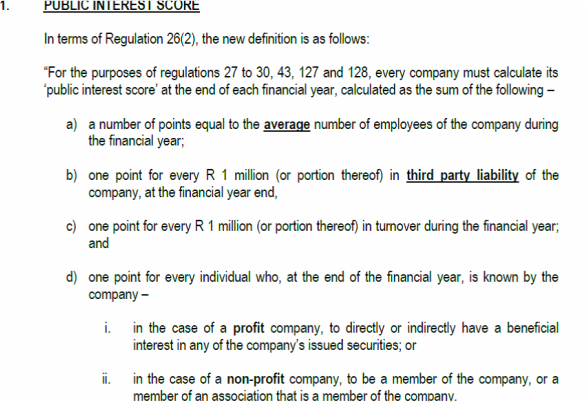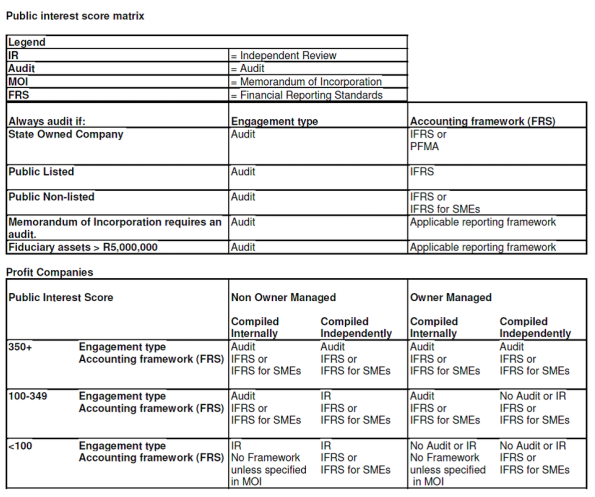Establishing a BUSINESS in South Africa
Types of Companies
There are two types of companies that can be incorporated under the Companies Act, 2008. These encompass:
1. Profit companies
2. Non-profit companies
1. Profit companies
In terms of profit companies, the following types of companies can be incorporated:
Private Companies
Private companies are incorporated for the purpose of financial gain for their shareholders. Private companies are prohibited from offering securities to the public. In addition, the transferability of their shares are also restricted. Previously, private companies were restricted to 50 shareholders; however, this has now changed under the Companies Act, 2008.
Advantages
§ Limited liability
§ Allows for ownership and control to be more practical for a greater number of people
§ Allows for incorporation
§ Can have more than 50 shareholders
Disadvantages
§ Can have cumbersome tax and financial audit requirements
§ Subject to capital gains tax
Public Companies
A public company is a profit company that is not a state-owned company, a private company or a personal liability company. The difference between public and private companies is that public companies may offer their shares to the public.
Advantages
§ Public companies have limited liability
§ They can have an unlimited number of shareholders
§ Shares are transferable
Disadvantages
§ Annual financial statements must be prepared within six months after the end of the financial year. These financial statements must also be audited.
§ Constant rate of tax regardless of the income level
§ Subject to capital gains tax
Personal Liability Companies (Inc)
This type of company is characterized by having unlimited liability. The directors and past directors are jointly and severally liable together with the company for any liabilities arising during the period of office.
State Owned Companies
These are entities that are either owned by a municipality or defined as a ‘state owned enterprise’ by the Finance Management Act 1 of 1999.
2. Non-profit companies
Non-profit Companies (NPC)
Unlike private companies, non-profit companies are not set up with the objective of making profits. Income generated from non-profit companies are not distributed to members, incorporates, directors, officers or persons related to them. Income is used for the overriding purpose/ mission of the non-profit company.
Advantages
§ They exist as a legal entity in their own right and separately from their founders, members or directors
§ The incorporation of such companies puts the overriding purpose of the entity above the personal interests of the directors, members or incorporates. Non profit companies are in a position to raise funds by soliciting charitable donations from the public
§ Non-profit companies positively contribute to the welfare of society
§ Non-profit companies benefit from partial tax exemptions and donor deductibility for contributions to non-profit companies
Disadvantages
§ They are not set up for profit, hence, in most cases, they are not as competitive as private or public companies
§ A non-profit company may not amalgamate or merge with, or convert to, a profit company
§ It may not dispose of any part of its assets, undertakings or business to a profit company at a profit. Such transactions should be at fair value. Exceptions are however possible where the disposal of assets occurs in the ordinary course of the activities of the non-profit company
Foreign and External Companies
A foreign company is defined as follows:
It is a company incorporated outside of South Africa, irrespective of whether it is a profit or non-profit company or carrying on business in South Africa or not. A foreign company is required to register as an “external company” with the Companies and Intellectual Property Commission if it conducts or intends to conduct business in South Africa. The Companies Act in terms of Sect 23 lists a series of activities which will be regarded as conducting business. This list is much broader than the provision in the 1973 Companies Act relating to a “place of business” in South Africa.
DOCUMENTS WE REQUIRE TO PROCESS YOUR PTY LTD APPLICATION (TURNAROUND TIME: 2 WEEKS)
1. Limited power of attorney signed.
2. Copies of ID document of every director/shareholder
3. Directors/sharehodlers detail (incl residential and business address), contact number, emails
DOCUMENTS WE REQUIRE TO PROCESS EXTERNAL COMPANY APPLICATION (TURNAROUND TIME: 4-6 WEEKS)
We require the following information from you:
1. Certified passport copies (if foreign national) or certified Identify Document (ID) copies (if South African) of all indicated initial directors and incorporators
2. A certified ID copy of the applicant if the application is not made by one of the indicated initial directors or incorporators
3. If the Memorandum of Incorporation is in a foreign language submit Notarially Certified Translated (to English) foreign Memorandum and Articles of Association
4. Notarially Certified Translated (to English) copy of certificate of incorporation
5. Business address outside the RSA
6. Business address within RSA
7. Directors detail (incl residential and business address), contact number, emails
AUDIT REQUIREMENT/FINANCIAL STATEMENT
The new Companies Act, which came into effect on 1 May 2011, introduced different levels of assurance for different categories of companies. All public and state-owned companies require an audit. Private, personal liability or non-profit companies, however, only require an audit when it’s in the public interest, as indicated by prescribed criteria such as the value of the company’s turnover or assets
There are two types of companies that can be incorporated under the Companies Act, 2008. These encompass:
1. Profit companies
2. Non-profit companies
1. Profit companies
In terms of profit companies, the following types of companies can be incorporated:
Private Companies
Private companies are incorporated for the purpose of financial gain for their shareholders. Private companies are prohibited from offering securities to the public. In addition, the transferability of their shares are also restricted. Previously, private companies were restricted to 50 shareholders; however, this has now changed under the Companies Act, 2008.
Advantages
§ Limited liability
§ Allows for ownership and control to be more practical for a greater number of people
§ Allows for incorporation
§ Can have more than 50 shareholders
Disadvantages
§ Can have cumbersome tax and financial audit requirements
§ Subject to capital gains tax
Public Companies
A public company is a profit company that is not a state-owned company, a private company or a personal liability company. The difference between public and private companies is that public companies may offer their shares to the public.
Advantages
§ Public companies have limited liability
§ They can have an unlimited number of shareholders
§ Shares are transferable
Disadvantages
§ Annual financial statements must be prepared within six months after the end of the financial year. These financial statements must also be audited.
§ Constant rate of tax regardless of the income level
§ Subject to capital gains tax
Personal Liability Companies (Inc)
This type of company is characterized by having unlimited liability. The directors and past directors are jointly and severally liable together with the company for any liabilities arising during the period of office.
State Owned Companies
These are entities that are either owned by a municipality or defined as a ‘state owned enterprise’ by the Finance Management Act 1 of 1999.
2. Non-profit companies
Non-profit Companies (NPC)
Unlike private companies, non-profit companies are not set up with the objective of making profits. Income generated from non-profit companies are not distributed to members, incorporates, directors, officers or persons related to them. Income is used for the overriding purpose/ mission of the non-profit company.
Advantages
§ They exist as a legal entity in their own right and separately from their founders, members or directors
§ The incorporation of such companies puts the overriding purpose of the entity above the personal interests of the directors, members or incorporates. Non profit companies are in a position to raise funds by soliciting charitable donations from the public
§ Non-profit companies positively contribute to the welfare of society
§ Non-profit companies benefit from partial tax exemptions and donor deductibility for contributions to non-profit companies
Disadvantages
§ They are not set up for profit, hence, in most cases, they are not as competitive as private or public companies
§ A non-profit company may not amalgamate or merge with, or convert to, a profit company
§ It may not dispose of any part of its assets, undertakings or business to a profit company at a profit. Such transactions should be at fair value. Exceptions are however possible where the disposal of assets occurs in the ordinary course of the activities of the non-profit company
Foreign and External Companies
A foreign company is defined as follows:
It is a company incorporated outside of South Africa, irrespective of whether it is a profit or non-profit company or carrying on business in South Africa or not. A foreign company is required to register as an “external company” with the Companies and Intellectual Property Commission if it conducts or intends to conduct business in South Africa. The Companies Act in terms of Sect 23 lists a series of activities which will be regarded as conducting business. This list is much broader than the provision in the 1973 Companies Act relating to a “place of business” in South Africa.
DOCUMENTS WE REQUIRE TO PROCESS YOUR PTY LTD APPLICATION (TURNAROUND TIME: 2 WEEKS)
1. Limited power of attorney signed.
2. Copies of ID document of every director/shareholder
3. Directors/sharehodlers detail (incl residential and business address), contact number, emails
DOCUMENTS WE REQUIRE TO PROCESS EXTERNAL COMPANY APPLICATION (TURNAROUND TIME: 4-6 WEEKS)
We require the following information from you:
1. Certified passport copies (if foreign national) or certified Identify Document (ID) copies (if South African) of all indicated initial directors and incorporators
2. A certified ID copy of the applicant if the application is not made by one of the indicated initial directors or incorporators
3. If the Memorandum of Incorporation is in a foreign language submit Notarially Certified Translated (to English) foreign Memorandum and Articles of Association
4. Notarially Certified Translated (to English) copy of certificate of incorporation
5. Business address outside the RSA
6. Business address within RSA
7. Directors detail (incl residential and business address), contact number, emails
AUDIT REQUIREMENT/FINANCIAL STATEMENT
The new Companies Act, which came into effect on 1 May 2011, introduced different levels of assurance for different categories of companies. All public and state-owned companies require an audit. Private, personal liability or non-profit companies, however, only require an audit when it’s in the public interest, as indicated by prescribed criteria such as the value of the company’s turnover or assets


